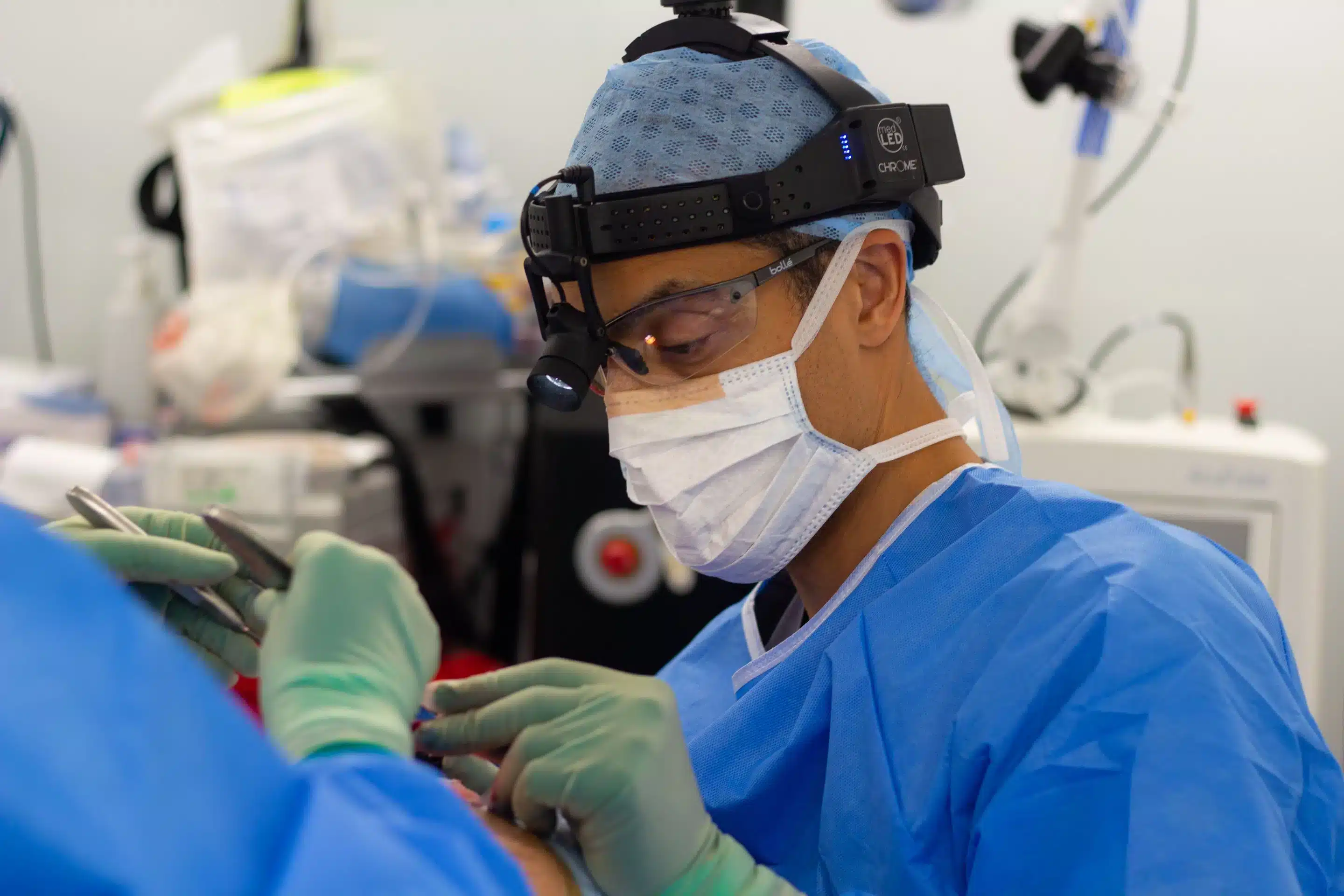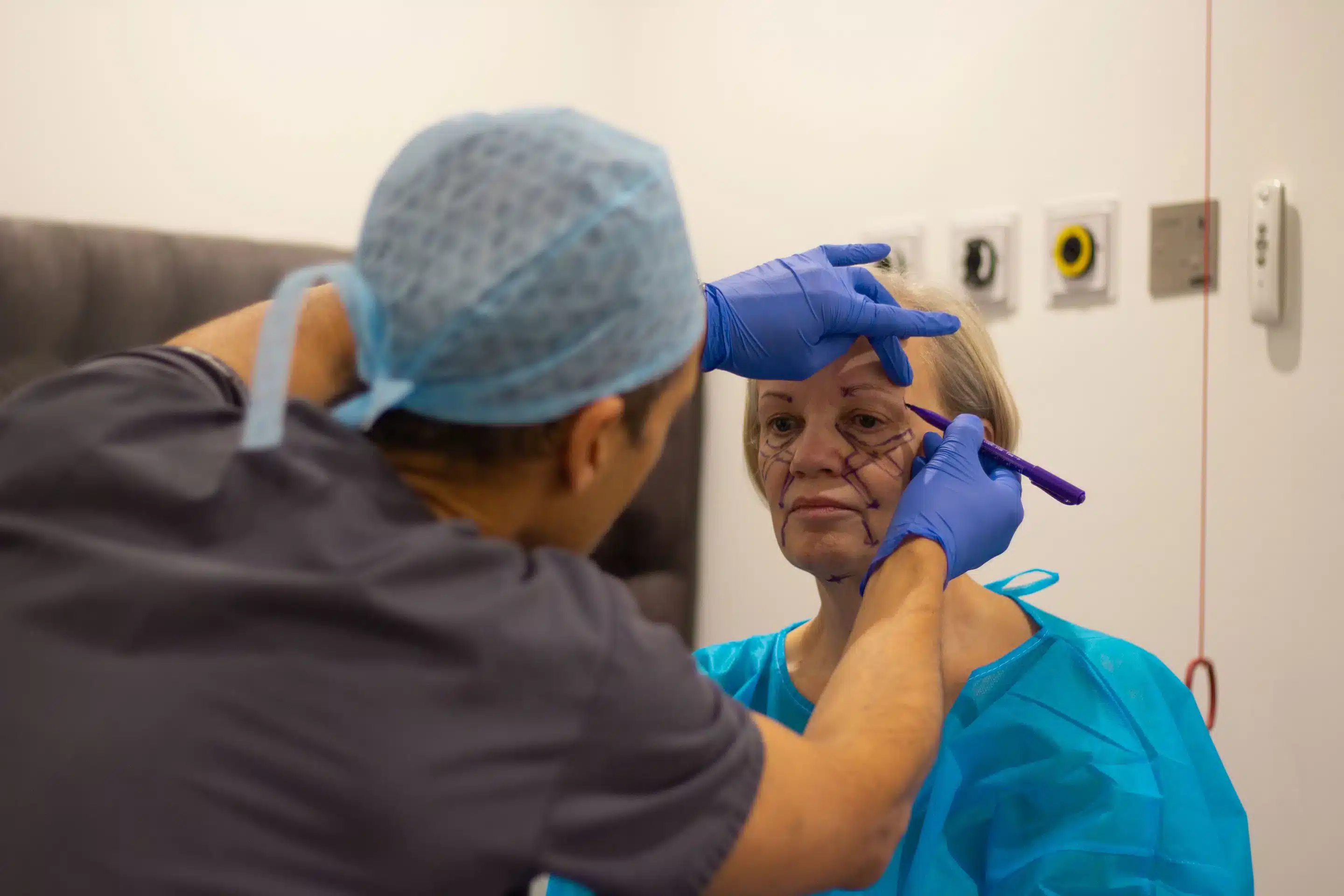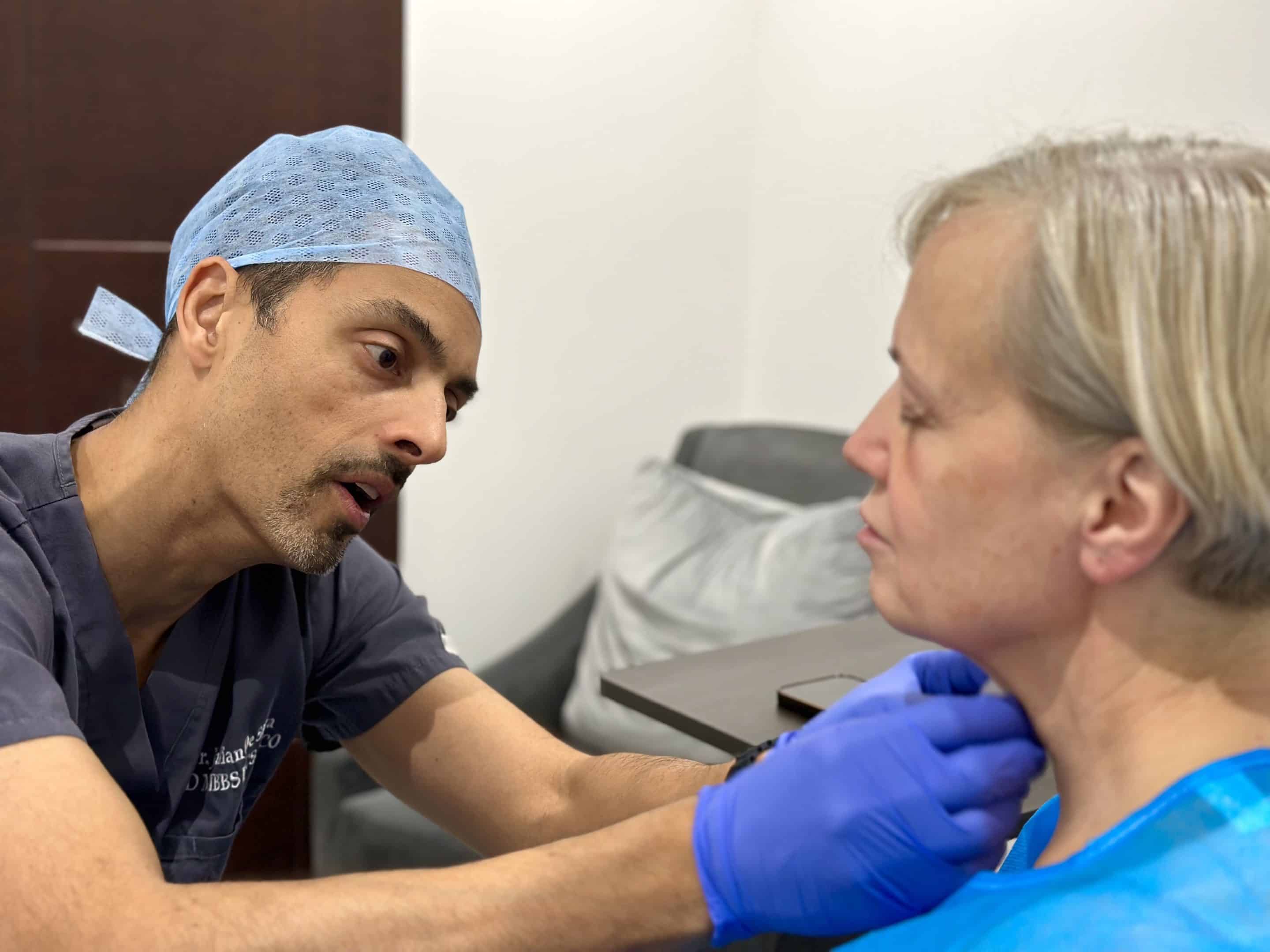
Your nasal valve area is crucial to breathing, so a collapsed one can cause breathing difficulties.
Nasal valve collapse causes the nose to become narrower. It usually occurs along with sinusitis and chronic rhinosinusitis. It can lead to difficulty breathing through the nose and other symptoms such as postnasal drip, loss of smell, and difficulty.
Thankfully, nasal valve collapse can be treated with nasal valve surgery. But how exactly does this work?
In this article, I will talk about nasal surgery, the causes of internal nasal valve collapse, and its symptoms. I will also talk about nasal surgery preparation and recovery.
How Do You Fix a Collapsed Nasal Valve?
You can fix a collapsed nasal valve with surgery. The same treatment applies if your nasal airway gets compromised because of nasal obstruction.
The procedure is performed by a rhinoplasty surgeon like me, Dr. Julian De Silva.
First, I will make an incision in your nose and lift the skin to expose the cartilage underneath. I will then trim away any excess cartilage or bone to create more space for your nostrils. This will help prevent the collapse from reoccurring over time by allowing them to open more easily when you breathe through your nose.
In some cases, it may be necessary for you to have additional procedures done at the same time as repairing a collapsed nasal valve. For example, if your septum is crooked or asymmetrical due to having been broken before, this issue should also be addressed during surgery so that both problems are fixed at once instead of having them exist separately during recovery periods.
Moreover, nasal surgery can be done along with other procedures such as eyebrow lift, deep plane facelift, ear cartilage graft, facial plastic surgery, and blepharoplasty.
What Causes a Nasal Valve Collapse?

Peer reviewed studies state that many factors can cause collapsed valves.
If the valve is unable to close properly, you will experience a loss of airflow through your nostrils. Infections, surgical damage, or trauma to the nose can also lead to collapsed valves.
Additionally, certain diseases, including sinusitis or facial trauma, can cause the opposite problem: an over-opened nasal valve that allows too much air into your sinuses and lungs. Surgery can also help if you have an over-opened nasal valve because of age-related degeneration.
Some people opt for surgery when they want cosmetic and medical improvement (e.g. fixing the nasal airway). This type of surgery does carry risks, so please make sure you discuss these carefully with your surgeon before deciding whether it is right for you.
How Do You Know if Your Nasal Valve Collapsed?
Here’s what usually occurs if your nasal valve collapsed:
Snoring
If you snore loudly and often, your nasal valve might have collapsed. The soft tissue in the back of the nose can also become swollen and block airflow through it during sleep.
Sleep Apnea
This condition occurs when breathing stops for short periods during sleep—and this can cause serious health problems down the line as well as poor quality of sleep.
Difficulty Breathing
If you have a collapsed nasal valve, you will find it hard to breathe.
Headaches
The symptoms of headaches include pain or pressure inside the head (including temples), sensitivity to light or sound, blurred vision, and nausea/vomiting with head movement. It’s possible that these headaches are linked to a collapsed nasal valve because they may be caused by increased cranial pressure. This happens because of insufficient airflow through an obstructed nasal passage and nasal airflow.
Can Nasal Valve Collapse Heal on Its Own?

Only a proper nasal septum surgery can treat the collapsed valve area.
No, nasal valve collapse can’t heal on its own. Only proper treatment can heal internal nasal valve collapse and external nasal valve collapse.
If you are having trouble breathing through your nose or if your symptoms worsen over time, it’s best to see a doctor as soon as possible. Remember, only a specialist can diagnose nasal valve collapse.
Nasal Valve Collapse and Treatment
The nasal valve is the narrow space at the top of your nose where mucus exits from your nostrils to drain into your throat. When you breathe in through your mouth, this sphincter opens to allow air to pass into the lower portion of your nasal cavity. When you exhale, it closes again to keep air from escaping through the nose.
When deviated septa cause obstruction and block airflow through one or both nostrils, bleeding or swelling inside the nose occurs. As a result, many people who have undergone corrective surgery for deviated septum experience some degree of postoperative swelling for several weeks after their procedure.
However, a collapsed nasal valve is different because it occurs when one or more muscles that support either side of that sphincter become weakened or damaged due to injury. This allows mucus buildup within certain areas of your sinuses instead of allowing natural drainage through normal pathways.
Hence, it’s important to get it treated not only because its effects on the nasal valve area are unpleasant but also potentially dangerous. Infections caused by resulting inflammation can lead to worse downstream conditions such as further external nasal valve damage and blood clots forming under artery walls and upper lateral cartilage.
Causes and Treatment of Nasal Valve Collapse

Trauma, a botched surgery, and deviated septa cause a collapsed valve area.
Here are the common causes of the nasal collapse and their corresponding treatment:
Nasal Valve Collapse Caused by Trauma
Injuries are one of the most common causes of the collapse of the nasal valve. As a result of this, the central columella, which is the cartilage that forms in the nose’s center, will be pushed to one side. This also causes the airway to become narrower, which makes it difficult to breathe.
Nasal Valve Collapse Caused by Nose Surgery
When you breathe in, your external valves may get constricted if you have weak cartilage at the tip of your nose or if they are oriented in an upward direction.
If you’ve had a rhinoplasty in the past, it’s possible that the lower lateral cartilages were partially removed during the procedure, which will also make the exterior valves less strong. An expansion of the skin and cartilage in the space between your nostril can lead to a narrow external valve.
Nasal Valve Collapse Caused by Deviated Septum
If the upper lateral cartilages of the internal valves are weak or very narrow, this can cause the valves to collapse when inward breathing is performed. Any deviation of the septum in the region of the internal valve that occurs toward the valve itself will also result in a constriction of the valve.
Nasal valve collapse due to deviated septum can be treated through surgery.
Signs of Nasal Valve Collapse?
- Difficulty breathing
- Runny nose
- Nasal congestion
- Snoring
- Sleep apnea
- Headaches, including migraines
What Does Valve Collapse Look Like?

A doctor can prescribe pain medication to manage the same symptoms as above.
If you can’t breathe properly through your nose and/or have a stuffy nose that does not respond to a nasal valve dilator or over-the-counter steroid nasal sprays, you may have nasal valve collapse.
External valve collapse becomes apparent when you breathe in and the nostril on either or both side closes on itself. Internal valve collapse, on the other hand, is less apparent on the outside. However, the upper middle portion of the nose on either side looks narrow as you breathe in.
Preparation for Nasal Valve Surgery
Before getting the treatment, you must know what to expect and how to prepare for your procedure.
As a general rule, you should not eat or drink anything for six hours before surgery. If you are taking any medications that thin the blood, you should stop taking them at least three days beforehand.
You should also stop taking antihistamines at least 24 hours before the nose surgery because they can increase swelling in your nose.
Finally, if you have a cold or allergy symptoms such as congestion or a stuffy nose, it’s best not to have surgery until they have gone away. This will help ensure that there is plenty of room inside your nasal passages during recovery from surgery on the nasal valve area.
Are There Additional Ways to Fix the Valves?

If your nasal valve collapse is causing you problems, there are a few other treatments that you can try.
These include:
Use steroid sprays and creams.
Steroid sprays, creams, and pills are often used to help the nose heal from injury or surgery. These treatments help reduce inflammation in your nasal tissue and may help your nasal valve return to its normal position.
Try a nasal valve dilator.
A nasal valve dilator is used to decrease nasal airflow resistance. By reducing nasal resistance, it lowers the work of breathing. As a result, the oxygen supply to the body increases.
Get nasal surgery.
If other treatment options haven’t worked for you, then plastic surgery may be an option for restoring the structure of your nose so that it functions properly again. Surgery is also the only permanent solution to nasal valve collapse.
After Surgery and Recovery
After surgery, you can expect a recovery period of four to six weeks. You will be unable to exercise or play contact sports. You should also avoid alcohol and smoking. Additionally, you should avoid caffeinated drinks and spicy foods during recovery as well.
If your condition worsens after surgery, you must follow up with your doctor immediately. If left untreated or ignored for too long, nasal valve collapse may lead to serious health problems such as infections and sleep apnea.
Visit Dr. Julian de Silva – Rhinoplasty, London
If you are experiencing nasal valve collapse, then seek out a specialist who understands individual nasal anatomy including your nasal valves. You should also choose someone who understands nasal breathing and conceals scar tissue well.
If you want to work with a board-certified doctor who specialises in sinus surgery, contact me to book a consultation now!





